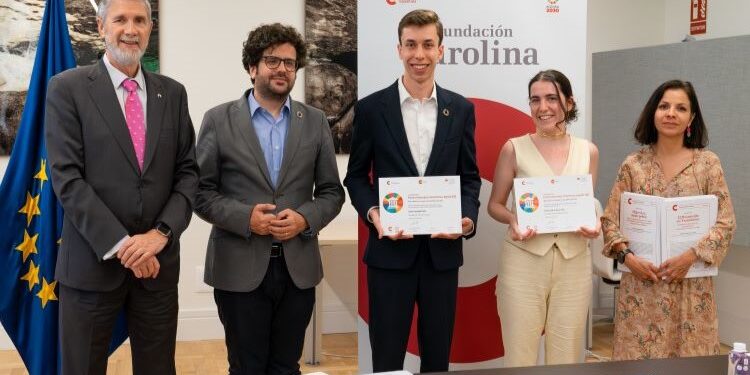The Diplomat
The Carolina Foundation, the Spanish Agency for International Development Cooperation (AECID) and the Conference of Rectors of Spanish Universities (CRUE) have awarded the ‘University, Knowledge and 2030 Agenda’ Awards.
This is the fifth edition of these awards, awarded to the best Final Degree (TFG) and Master’s Final (TFM) projects. The delivery ceremony took place this Thursday in Madrid and was attended by Antón Leis, director of the AECID; Érika Rodríguez Pinzón, director of the Carolina Foundation; and Manuel Pérez Mateos, president of CRUE-Sustainability and rector of the University of Burgos.
In the TFG category, the work ‘Rich woman, poor woman: occupational gender gap throughout the distribution of wealth in low and middle-income countries’, carried out by Daniel Hernández Peña, tutored by Professor Gustavo, was awarded. Alberto Marrero Díaz and defended at the University of La Laguna.
In the TFM category, the award went to ‘Development in transition: perspectives to strengthen cooperation with Latin America and the Caribbean’, carried out by Berenice Miren Areso Yebra, tutored by Professor Miguel Ángel González and defended at the Diplomatic School of the Ministry of Foreign Affairs, European Union and Cooperation.
“Reaching a fifth year proves the relevance of this initiative as a relevant channel for disseminating the 2030 Agenda,” declared Antón Leis during the event, in which he pointed out the relevance of this initiative due to the importance of disseminating the SDGs among our society in general and among the academic world in particular. This initiative, he assured, has been supported by some universities and municipalities in other areas “also linked to the dissemination of the SDGs.”
For her part, Érika Rodríguez Pinzón celebrated the consolidation of this contest, “which has become a reference call for the entire university community concerned by the 2030 Agenda.” “This is attested to by the 3,000 works that have been submitted to these Awards since their inception and the enormous interest they continue to arouse, mostly, and as usual, among women,” she added.
Finally, Manuel Pérez Mateos highlighted that, with these Awards, “two of the great challenges of the University come together: internationalization and sustainability.” Likewise, he congratulated and thanked the winners for their “extraordinary work” on social and economic sustainability, which will help “solve one of the biggest problems in today’s society: enormous inequality.” “You are the future and you will have the opportunity to lead changes in positions of responsibility to make a more sustainable and fair world,” he concluded.







